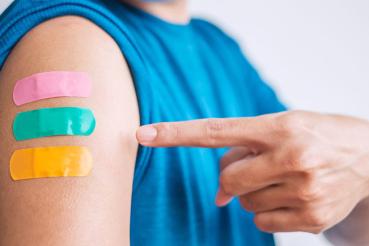Americans understandably are concerned about the recent surge of cases of COVID-19 driven by the omicron variant of the coronavirus. Here are answers to some of the more common questions about omicron.
How contagious is omicron compared to the delta variant?
How easily omicron inherently spreads compared to delta is unknown. Some very early data suggests that omicron’s main advantage over the delta variant is its ability to evade immunity from prior COVID-19 infection or vaccination.
What makes one virus more contagious than another?
Mutations in the coronavirus can change its ability to infect cells. In particular, mutations in the “spike” protein on the virus’s surface, which it uses to enter the cells the virus infects, can cause it evade vaccine immunity or more easily infect certain cells.
I’ve heard omicron cases are milder. Is that true?
So far, severe disease is occurring in a smaller percentage of omicron cases in the United States and elsewhere than in the cases caused by the delta variant and the original coronavirus, which suggests that omicron cases are milder. However, we don’t know how much of this difference is due to the omicron variant itself being less virulent than other strains of the virus, and how much is due to omicron cases occurring in a significantly larger number of people who have been vaccinated against COVID-19 and/or recovered from a prior case of the disease. It’s probably a combination of both factors, but we don’t know how much each accounts for the lesser severity.
If omicron cases are milder, why do I still need to be careful?
When thinking about omicron being “milder,” it’s important to keep in mind that omicron’s mutations allow it to infect more vaccinated people (that is, cause breakthrough infections) and reinfect people who previously had COVID-19, but the immunity to the disease these people gained from vaccination and prior infection seems to be protecting most of them from developing severe disease. However, people who aren’t vaccinated still are at risk for getting seriously ill from omicron, especially if they haven’t previously had a case of COVID-19.
Also, we need to protect ourselves from becoming infected in order to avoid passing on the infection to others, particularly people who are unvaccinated or vaccinated but still at risk due to older age or health conditions. As it has been throughout the pandemic, we need to protect ourselves in order to also protect others.
Is omicron leading to more hospitalization?
We are seeing increases in hospitalizations at Rush system hospitals and in the Chicago area, Illinois and throughout the United States. Fortunately, so far hospitalizations have not increased nearly as much relative to the rising number of new cases we’ve seen in previous surges (even allowing for new hospitalizations lagging new cases). The same situation occurred in South Africa, where omicron first was identified, and where the surge of new cases now has dropped sharply. This gives us reason to hope that a smaller percentage of new cases will lead to hospitalizations than occurred in previous surges of COVID-19. In fact, it may be that those hospitalizations still mostly are being driven by the delta variant.
Is omicron leading to more deaths?
We don’t know yet. Deaths from COVID-19 have been rising in Illinois and in Cook County since late November, but most deaths follow a diagnosis of COVID-19 by several weeks, and omicron only wasn’t detected in the state until Dec. 7.
If I’m vaccinated, am I protected against omicron?
People who have received one of the mRNA vaccines against COVID-19 (the Pfizer-BioNTech or Moderna vaccines) have a good degree of protection against severe disease, hospitalization and death due to omicron, and people who have received a booster dose of these vaccines have even more protection. People who received the Johnson & Johnson vaccine have less protection and should get a booster shot of one of either the Pfizer or Moderna vaccine, which will greatly increase their protection, as soon as they are more than two months after their vaccination.
So far, the vast majority of people hospitalized with cases of COVID-19 caused by the omicron variant have been unvaccinated, and very nearly all of the people who have died from these cases have been unvaccinated.
However, omicron’s mutations are allowing it to cause breakthrough infections in far more vaccinated people, including people who have received a booster shot, than previous strains of the coronavirus did. Many of these infections cause no symptoms, but infected people still can pass on the infection to others. In vaccinated people with symptoms, the cases tend to be mild, similar to a cold.
If I’m boosted, is that better?
Yes. People who have received a booster does of either the Pfizer or Moderna vaccine are much more protected against symptomatic infection, serious illness, hospitalization and death than people who are vaccinated but haven’t gotten a booster once they’re able to receive one (two months after a Johnson & Johnson vaccine, or six months after the second dose of a Pfizer or Moderna vaccine).
Do monoclonal antibodies work against omicron?
Unfortunately, most of the existing monoclonal antibody treatments for COVID-19 are ineffective against the omicron variant of the coronavirus. The only effective monoclonal antibody treatments for omicron that currently are available are sotrovimab (also known by the brand name Xevudy) and tixagevimab/cilgavimab (brand name EVUSHELD), and both have uncertain availability. We will follow public health guidance for prescribing these treatments.
I’ve heard there are some oral antiviral medications that will soon be available. Is that true?
Yes. The Food and Drug Administration has provided an Emergency Use Authorization (EUA) for Pfizer’s antiviral drug Paxlovid for people ages 12 years and older who have tested positive for COVID-19 and have conditions that put them at high risk of severe disease or death. The FDA also provided an EUA for Merck’s antiviral drug molnupiravir for people ages 18 years and older who are positive for COVID-19 and a high risk of severe disease or death.
These drugs are believed to be effective against omicron, and they may greatly reduce the numbers of severe cases of COVID-19 and deaths from the disease. However, they have uncertain availability and limits on their use. We will offer them to patients as our supply allows and follow FDA and National Institutes of Health treatment guidance.
You can read more about these drugs in an article here.
How dangerous is omicron to children, especially unvaccinated children too young to be vaccinated (i.e., how likely is it they can they become severely ill, and even die, from it)?
While pediatric data regarding the omicron variant's severity is still limited, we do know that children can very easily become infected, even more so in unvaccinated children. During this omicron wave, we are seeing a significant amount of pediatric patients requiring hospitalization — the most to date here at the Medical Center, in Chicago and in the United States.
The American Academy of Pediatrics reported that in the week ending Dec. 30, more than 325,000 childhood cases of COVID-19 infection were reported nationally, a 64% increase compared with the beginning of December. Pediatric COVID-19 hospitalizations are also up 66% over the last few weeks, according to national data. While some children are presenting with severe disease, the majority of hospitalized children are not requiring intensive care.
The vast majority of the children being hospitalized are unvaccinated, including children under the age of 5, who are ineligible for vaccination (vaccines are expected to be available to children ages 2 to 5 in the second quarter of 2022). This underscores our continued need to keep vaccinating children who are eligible by age and adults, to protect those who are too young to be vaccinated. Booster shots also significantly increase a person’s protection, so all eligible for boosters should receive them as soon as possible.
Data also suggest that vaccinated people are also less likely to transmit the virus than the unvaccinated, and they shed the virus for shorter periods. This is important because people who are eligible to get the vaccine can protect those who are not yet eligible to get the vaccine, such as the children under 5 years old. Many transmissions are occurring within the household and at large gatherings.
How much protection would boosters provide for the 16- to 18-year-olds who can get a Pfizer booster?
The most recent data regarding a booster dose, a third dose after a two-dose series, shows that there is significantly increased protection (i.e. production of neutralizing antibodies) against SARS-CoV-2 infection, including the omicron variant. Neutralizing antibody levels have reportedly been shown to increase up to 25 times after a booster dose. Booster doses are important for those older teens who may now be many months out from their initial two-dose series, particularly in the midst of exceedingly high community transmission. A Pfizer booster dose may be received five months after completing the primary two-dose series of the vaccine.
The FDA authorized booster doses for the 12- to 15-year-old age group on Jan. 3, and a Centers for Disease Control and Prevention committee will review the data and decide whether to affirm the FDA’s authorization.




